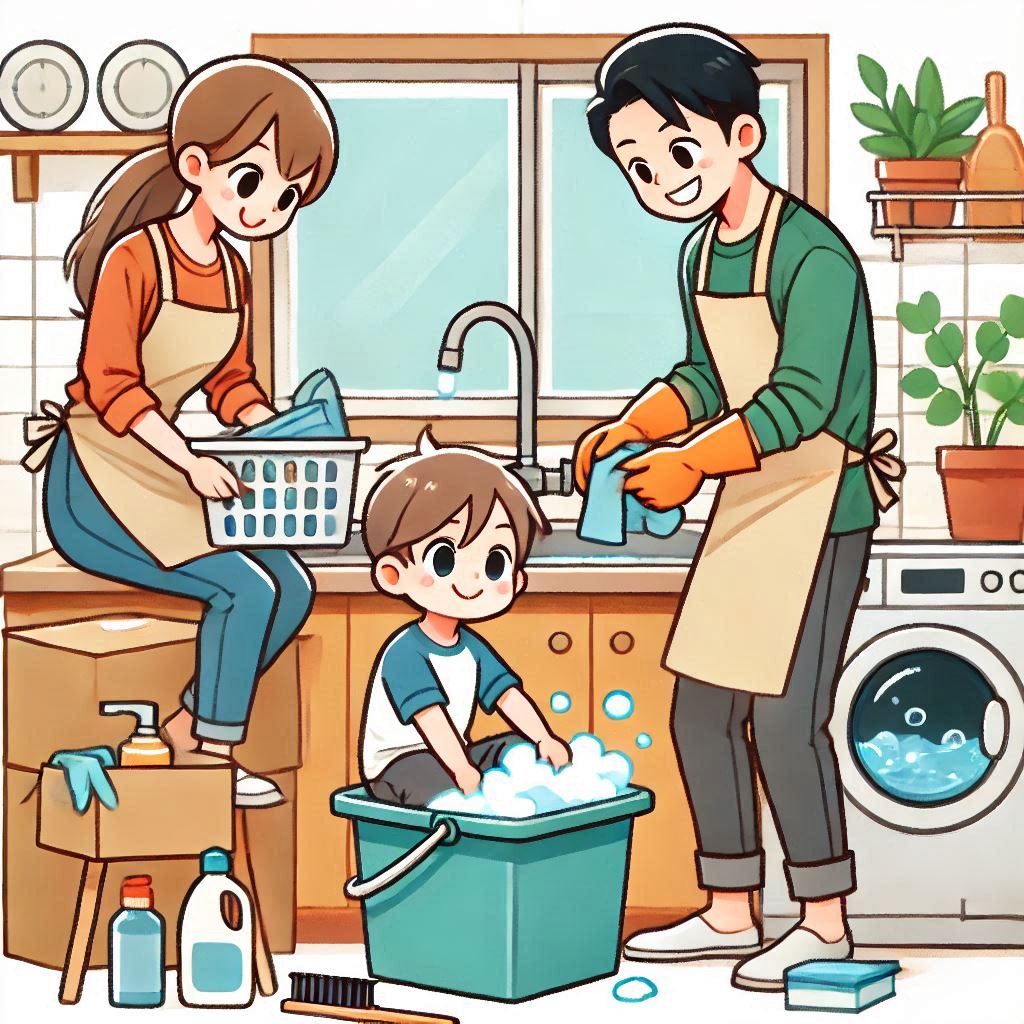Your basket is currently empty!

Stress-Free Parenting: How Sharing Responsibilities Creates a Happier Home
Parenting is a shared journey that requires emotional balance, mutual respect, and effective communication between parents. Both fathers and mothers play crucial roles in creating a positive and nurturing home environment. When fathers manage their stress effectively and mothers maintain a balanced mood, it not only improves their individual well-being but also ensures happy parenting and a harmonious home for children.
Parenting is a rewarding yet challenging journey that requires both parents to navigate various responsibilities, emotions, and stressors. In many households, the dynamics between the father’s stress levels and the mother’s emotional well-being play a crucial role in creating a harmonious and happy environment for the entire family. This article delves into why a stressed father and a mother who maintains a positive mood are pivotal for happy parenting at home. It also explores how sharing responsibilities can foster a supportive atmosphere conducive to joyful and effective parenting.
1. Understanding the Roles of Fathers and Mothers in Parenting
Traditional vs. Modern Dynamics
Historically, parenting roles were often divided along traditional lines, with fathers serving as the primary breadwinners and mothers taking on the bulk of child-rearing responsibilities. However, contemporary families are increasingly embracing more balanced and flexible roles. Both parents are now more involved in various aspects of parenting, from daily caregiving tasks to emotional support and decision-making.
Impact on Children
The mental and emotional states of both parents significantly influence children’s development. Children observe and emulate their parents’ behaviors and emotional responses. A harmonious parental relationship and positive emotional climate at home contribute to children’s sense of security, emotional intelligence, and overall well-being.
2. The Impact of Father’s Stress on the Household
Emotional Climate
A father’s stress can permeate the household, affecting the emotional climate and overall atmosphere. High stress levels may lead to irritability, impatience, and decreased emotional availability, which can strain relationships with both the partner and the children.
Behavioral Effects on Children
Children are sensitive to their parents’ emotions. A stressed father might inadvertently model negative coping mechanisms, such as frustration or withdrawal, which children may mimic. This can lead to behavioral issues, anxiety, and a sense of instability within the family unit.
Relationship Strain
Persistent stress in fathers can create tension in the parental relationship. Communication breakdowns, reduced quality time, and increased conflicts can erode the partnership, making collaborative parenting more challenging.
3. The Importance of Mother’s Mood in Parenting
Creating a Positive Environment
A mother’s mood significantly shapes the home environment. When a mother maintains a positive and calm demeanor, it fosters a nurturing and secure space for children. Positive emotions are contagious and can enhance the overall mood of the household.
Emotional Security for Children
Children thrive in environments where they feel emotionally secure. A mother who manages her emotions effectively provides a stable foundation for children to express themselves, develop resilience, and build healthy emotional responses.
Role Modeling
Mothers often serve as primary role models for emotional regulation and interpersonal relationships. By demonstrating positive mood management, mothers teach children valuable life skills for handling their own emotions and relationships.
4. Sharing Responsibilities for Balanced Parenting
Equitable Distribution of Tasks
Sharing parenting and household responsibilities ensures that neither parent is overburdened, reducing the likelihood of stress and burnout. This balance allows both parents to contribute meaningfully to the family’s well-being.

Practical Ways to Share Responsibilities
- Divide Daily Tasks: Allocate chores such as cooking, cleaning, and childcare based on each parent’s strengths and schedules.
- Co-Parenting Strategies: Engage in joint decision-making regarding children’s education, healthcare, and extracurricular activities.
- Support Each Other’s Roles: Encourage and assist each other in fulfilling parenting duties, fostering a sense of teamwork.
Benefits of Shared Parenting
- Reduced Stress Levels: Sharing responsibilities alleviates individual burdens, promoting better mental health for both parents.
- Enhanced Relationship Quality: Collaborative parenting strengthens the partnership, enhancing mutual respect and understanding.
- Positive Role Modeling: Demonstrates to children the importance of cooperation, empathy, and shared responsibilities.
5. Strategies to Manage Father’s Stress and Support Mother’s Mood
For Fathers: Managing Stress
- Prioritize Self-Care: Engage in regular physical activity, pursue hobbies, and ensure adequate rest to maintain physical and mental health.
- Seek Support: Utilize support networks, such as friends, family, or professional counseling, to discuss and manage stressors.
- Effective Time Management: Balance work and personal life by setting realistic goals and delegating tasks when possible.
For Mothers: Maintaining a Positive Mood
- Self-Care Practices: Incorporate activities that promote relaxation and well-being, such as meditation, reading, or enjoying a hobby.
- Emotional Support: Foster open communication with partners and seek external support when needed to navigate emotional challenges.
- Set Boundaries: Establish healthy boundaries to prevent overwhelm and ensure time for personal rejuvenation.
Mutual Support Between Parents
- Open Communication: Regularly discuss feelings, challenges, and successes to maintain emotional connection and understanding.
- Shared Goals: Align on parenting philosophies and family goals to work cohesively towards common objectives.
- Appreciation and Encouragement: Acknowledge each other’s efforts and provide encouragement to build a supportive partnership.
6. Creating a Happy Parenting Environment
Building Open Communication
Encourage honest and open dialogue within the family. Effective communication fosters trust, resolves conflicts, and ensures that everyone’s needs are acknowledged and addressed.
Establishing Routines and Boundaries
Consistent routines provide structure and predictability, which are comforting for both parents and children. Clear boundaries help manage expectations and reduce potential conflicts.
Prioritizing Quality Family Time
Allocate time for family activities that promote bonding and create cherished memories. Whether it’s shared meals, outdoor activities, or family game nights, quality time reinforces familial connections and joy.
Conclusion
Happy parenting thrives on the delicate balance of both parents’ emotional and mental well-being. By addressing the father’s stress and supporting the mother’s mood, families can cultivate a nurturing and harmonious home environment. Sharing responsibilities not only alleviates individual burdens but also strengthens the parental partnership, setting a positive example for children. Prioritizing self-care, open communication, and mutual support are essential strategies for fostering happy and effective parenting. Remember, a happy and healthy family begins with happy and healthy parents.
Remember: Parenting is a collective journey that benefits immensely from cooperation, understanding, and mutual support. By managing stress and maintaining positive moods, fathers and mothers can create a loving and joyful environment that nurtures both their children and their relationship.

Leave a Reply